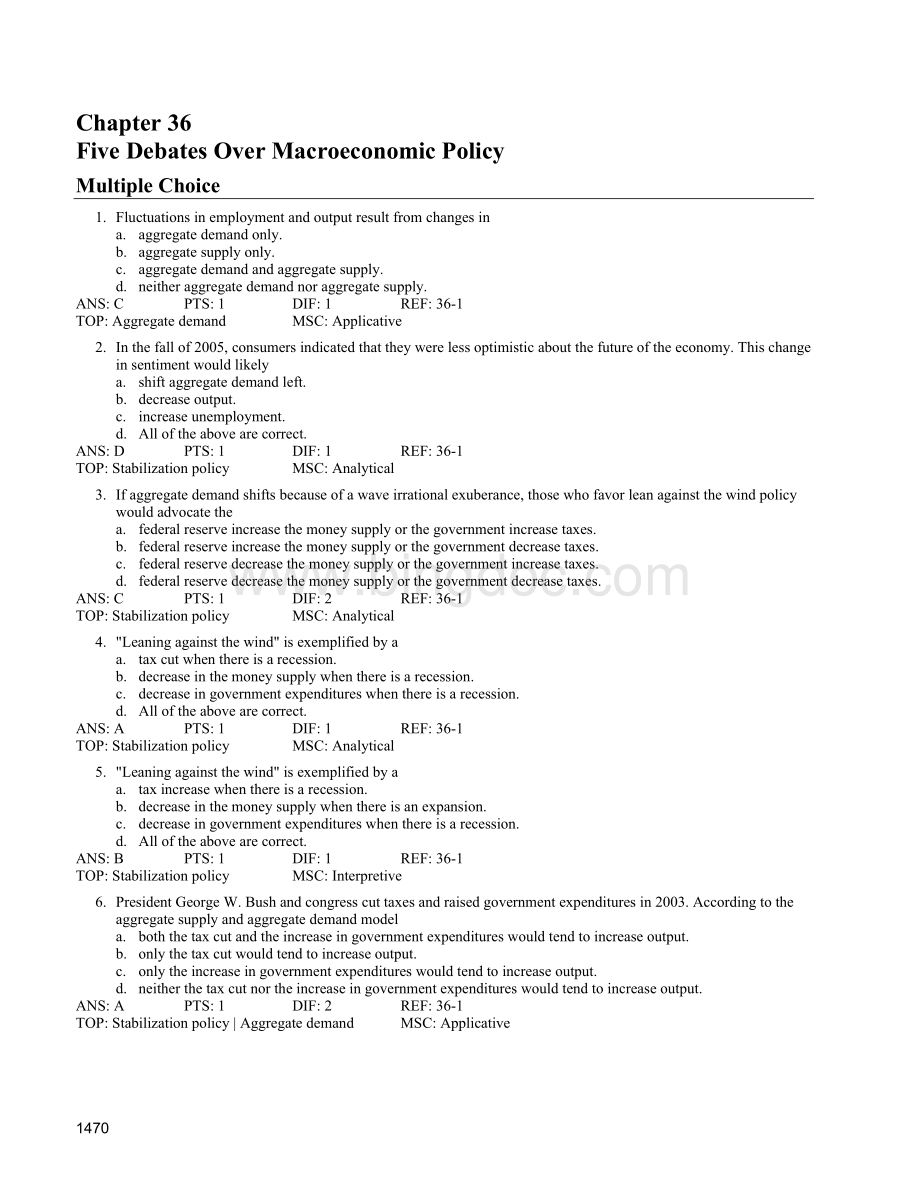经济学原理对应练习--36.doc
《经济学原理对应练习--36.doc》由会员分享,可在线阅读,更多相关《经济学原理对应练习--36.doc(20页珍藏版)》请在冰点文库上搜索。

Chapter36/FiveDebatesOverMacroeconomicPolicyv1489
Chapter36
FiveDebatesOverMacroeconomicPolicy
MultipleChoice
1. Fluctuationsinemploymentandoutputresultfromchangesin
a. aggregatedemandonly.
b. aggregatesupplyonly.
c. aggregatedemandandaggregatesupply.
d. neitheraggregatedemandnoraggregatesupply.
ANS:
C PTS:
1 DIF:
1 REF:
36-1
TOP:
Aggregatedemand MSC:
Applicative
2. Inthefallof2005,consumersindicatedthattheywerelessoptimisticaboutthefutureoftheeconomy.Thischangeinsentimentwouldlikely
a. shiftaggregatedemandleft.
b. decreaseoutput.
c. increaseunemployment.
d. Alloftheabovearecorrect.
ANS:
D PTS:
1 DIF:
1 REF:
36-1
TOP:
Stabilizationpolicy MSC:
Analytical
3. Ifaggregatedemandshiftsbecauseofawaveirrationalexuberance,thosewhofavorleanagainstthewindpolicywouldadvocatethe
a. federalreserveincreasethemoneysupplyorthegovernmentincreasetaxes.
b. federalreserveincreasethemoneysupplyorthegovernmentdecreasetaxes.
c. federalreservedecreasethemoneysupplyorthegovernmentincreasetaxes.
d. federalreservedecreasethemoneysupplyorthegovernmentdecreasetaxes.
ANS:
C PTS:
1 DIF:
2 REF:
36-1
TOP:
Stabilizationpolicy MSC:
Analytical
4. "Leaningagainstthewind"isexemplifiedbya
a. taxcutwhenthereisarecession.
b. decreaseinthemoneysupplywhenthereisarecession.
c. decreaseingovernmentexpenditureswhenthereisarecession.
d. Alloftheabovearecorrect.
ANS:
A PTS:
1 DIF:
1 REF:
36-1
TOP:
Stabilizationpolicy MSC:
Analytical
5. "Leaningagainstthewind"isexemplifiedbya
a. taxincreasewhenthereisarecession.
b. decreaseinthemoneysupplywhenthereisanexpansion.
c. decreaseingovernmentexpenditureswhenthereisarecession.
d. Alloftheabovearecorrect.
ANS:
B PTS:
1 DIF:
1 REF:
36-1
TOP:
Stabilizationpolicy MSC:
Interpretive
6. PresidentGeorgeW.Bushandcongresscuttaxesandraisedgovernmentexpendituresin2003.Accordingtotheaggregatesupplyandaggregatedemandmodel
a. boththetaxcutandtheincreaseingovernmentexpenditureswouldtendtoincreaseoutput.
b. onlythetaxcutwouldtendtoincreaseoutput.
c. onlytheincreaseingovernmentexpenditureswouldtendtoincreaseoutput.
d. neitherthetaxcutnortheincreaseingovernmentexpenditureswouldtendtoincreaseoutput.
ANS:
A PTS:
1 DIF:
2 REF:
36-1
TOP:
Stabilizationpolicy|Aggregatedemand MSC:
Applicative
7. PresidentGeorgeW.Bushandcongresscuttaxesandraisedgovernmentexpendituresin2003.Whichofthefollowingisnotcorrect?
a. Atthetimetheeconomywasjustmovingintoarecession.
b. Whiletherewassubsequentimprovementineconomicperformance,it’snotentirelyclearthatthiswasduetothepolicy.
c. Ingeneralmonetarypolicycanbeimplementedfasterthanfiscalpolicy.
d. Ingeneralitiseasiertoreversemonetarypolicythantoreversefiscalpolicy.
ANS:
A PTS:
1 DIF:
2 REF:
36-1
TOP:
Stabilizationpolicy|Aggregatedemand MSC:
Applicative
8. Policymakersfollowinga"leanagainstthewind"policywould
a. increasegovernmentexpenditureswhenoutputislowanddecreasethemwhenoutputishigh.
b. increasegovernmentexpenditureswhenoutputislowanddonothingwhenoutputishigh.
c. decreasegovernmentexpenditureswhenoutputislowandincreasethemwhenoutputishigh.
d. decreasegovernmentexpenditureswhenoutputishighanddonothingwhenoutputislow.
ANS:
A PTS:
1 DIF:
1 REF:
36-1
TOP:
Stabilizationpolicy|Policylags MSC:
Definitional
9. Iftheunemploymentraterises,whichpolicieswouldbeappropriatetoreduceit?
a. increasethemoneysupply,increasetaxes
b. increasethemoneysupply,cuttaxes
c. decreasethemoneysupply,increasetaxes
d. decreasethemoneysupply,cuttaxes
ANS:
B PTS:
1 DIF:
2 REF:
36-1
TOP:
Stabilizationpolicy MSC:
Applicative
10. TheFederalReservewilltendtotightenmonetarypolicywhen
a. interestratesarerisingtoorapidly.
b. itthinkstheunemploymentrateistoohigh.
c. thegrowthrateofrealGDPisquitesluggish.
d. itthinksinflationistoohightoday,orwillbecometoohighinthefuture.
ANS:
D PTS:
1 DIF:
2 REF:
36-1
TOP:
Monetarypolicy MSC:
Analytical
11. Iffirmswerefacedwithgreateruncertaintybecauseofconcernthatoilpricesmightrise,theymightdecreaseexpendituresoncapital.Inresponsetothischange,someonewhoadvocated"leanagainstthewind"policiesmightadvocate
a. decreasingthemoneysupply.
b. increasingtaxes.
c. increasinggovernmentexpenditures.
d. Noneoftheaboveiscorrect.
ANS:
C PTS:
1 DIF:
2 REF:
36-1
TOP:
Stabilizationpolicy MSC:
Analytical
12. Thosewhodesirethatpolicymakersstabilizetheeconomywouldadvocatewhichofthefollowingwhenaggregatedemandisinsufficienttoensurefullemployment?
a. decreasethemoneysupply
b. decreasetaxes
c. decreasegovernmentexpenditures
d. Noneoftheaboveiscorrect.
ANS:
B PTS:
1 DIF:
1 REF:
36-1
TOP:
Stabilizationpolicy MSC:
Analytical
13. Supposeaggregatedemandfell.Inordertostabilizetheeconomy,thegovernmentmight
a. increasethemoneysupply.
b. increasegovernmentexpenditures.
c. decreasetaxes.
d. Alloftheabovearecorrect.
ANS:
D PTS:
1 DIF:
1 REF:
36-1
TOP:
Stabilizationpolicy MSC:
Applicative
14. TheFedloweredinterestratesin2001and2002.Thisimplies,otherthingsthesame,thattheFed
a. increasedthemoneysupplybecauseitwasconcernedaboutunemployment.
b. increasedthemoneysupplybecauseitwasconcernedaboutinflation.
c. decreasedthemoneysupplybecauseitwasconcernedaboutunemployment.
d. decreasedthemoneysupplybecauseitwasconcernedaboutinflation.
ANS:
A PTS:
1 DIF:
2 REF:
36-1
TOP:
Stabilizationpolicy MSC:
Analytical
15. TheFedraisedinterestratesin2004and2005.Thisimplies,otherthingsthesame,thattheFed
a. increasedthemoneysupplybecauseitwasconcernedaboutunemployment.
b. increasedthemoneysupplybecauseitwasconcernedaboutinflation.
c. decreasedthemoneysupplybecauseitwasconcernedaboutunemployment.
d. decreasedthemoneysupplybecauseitwasconcernedaboutinflation.
ANS:
D PTS:
1 DIF:
2 REF:
36-1
TOP:
Stabilizationpolicy MSC:
Analytical
16. Theeffectsofadeclineinthevalueoffinancialassets,suchasstocks,onconsumptionandtheeconomymightbeoffsetby
a. increasinggovernmentspending.
b. decreasingthemoneysupply.
c. increasingtaxes.
d. Noneoftheaboveiscorrect.
ANS:
A PTS:
1 DIF:
2 REF:
36-1
TOP:
Stabilizationpolicy MSC:
Applicative
17. Theeconomygoesintorecession.Whichofthefollowinglistscontainsthingspolicymakerscoulddototrytoendtherecession?
a. increasethemoneysupply,increasetaxes,increasegovernmentspending
b. increasethemoneysupply,increasetaxes,decreasegovernmentspending
c. increasethemoneysupply,decreasetaxes,increasegovernmentspending
d. decreasethemoneysupply,increasetaxes,decreasegovernmentspending
ANS:
C PTS:
1 DIF:
2 REF:
36-1
TOP:
Stabilizationpolicy MSC:
Applicative
18. Howlonghavestudiesshownittakesforinterestratechangestoleadtosignificantchangesinspending?
a. Afewdays.
b. Afewweeks.
c. Afewmonths.
d. Afewyears.
ANS:
C PTS:
1 DIF:
2 REF:
36-1
TOP:
Policylags MSC:
Definitional
19. Ingeneral,thelongestlagfor
a. bothfiscalandmonetarypolicyisthetimeittakestochangepolicy.
b. bothfiscalandmonetarypolicyisthetimeittakesforpolicytoaffectaggregatedemand.
c. monetarypolicyisthetimeittakestochangepolicy,whileforfiscalpolicythelongestlagisthetimeittakesforpolicytoaffectaggregatedemand.
d. fiscalpolicyisthetimeittakestochangepolicy,whileformonetarypolicythelongestlagisthetimeittakesforpolicytoaffectaggregatedemand.
ANS:
D PTS:
1 DIF:
1 REF:
36-1
TOP:
Balancedbudget|Policylags MSC:
Definitional
20. Theprincipallagformonetarypolicy
a. andfiscalpolicyisthetimeittakestoimplementpolicy.
b. andfiscalpolicyisthetimeittakesforpolicytochangespending.
c. isthetimeittakestoimplementpolicy.Theprincipallagforfiscalpolicyisthetimeittakesforpolicytochangespending.
d. isthetimeittakesforpolicytochangespending.Theprincipallagforfiscalpolicyisthetimeittakestoimplementit.
ANS:
D PTS:
1 DIF:
2 REF:
36-1
TOP:
Policylags MSC:
Definitional
21. Theprincipalreasonthatmonetarypolicyhaslagsisthatittakesalongtimefor
a. changesintheinterestratetochangeaggregatedemand.
b. changesinthemoneysupplytochangeinterestrates.
c. theFedtomakechangesinpolicy.
d. Noneoftheaboveiscorrect.
ANS:
A PTS:
1 DIF:
1 REF:
36-1
TOP:
Policylags MSC:
Definitional
22. Opponentsofusingpolicytostabilizetheeconomygenerallybelievethat
a. neitherfiscalnormonetarypolicyhavemuchimpactonaggregatedemand.
b. attemptstostabilizetheeconomycanincreasethemagnitudeofeconomicfluctuations.
c. unemploymentandinflationarenotcauseformuchconcern.
d. Alloftheabovearecorrect.
ANS:
B PTS:
1 DIF:
1 REF:
36-1
TOP:
Stabilizationpolicy MSC:
Interpretive
23. Whichofthefollowingiscorrect?
a. economicforecastsarepreciseandaggregatespendingrespondsalmostimmediatelytointerestratechanges.
b. economicforecastarepreciseandaggregatespendingrespondstointerestratechangeswithalag.
c. economicforecastsareimpreciseandaggregatespendingrespondsalmostimmediatelytointerestratechanges.
d. economicforecastareimpreciseandaggregatespendingrespondstointerestratechangeswithalag.
ANS:
D PTS:
1 DIF:
2 REF:
36-1
TOP:
Policylags|Economicforecasts MSC:
Definitional
24. Whichofthefollowingisanargumentagain